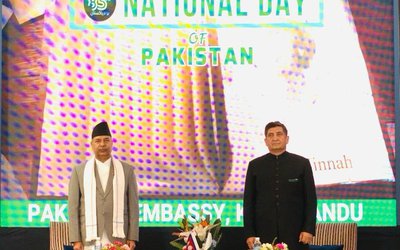The first session of our House of Representatives is now over without there being not much to show what has been achieved. There has been much too and fro words from amongst the non rulers to the members of the ‘Gathbandan’ who have been doing ‘HaTa’ i.e. presenting and fleeing with no sense of duty nor shame! Ministers who should be there to answer queries from members of the House do not seem to have the moral courage or the disposition to answer to what they have been doing when in power. Some members of the previous ruling party have been adding to the crescendo resounding in this chamber, but to what purpose? Both groups have not been able to say ‘Bhure, Bhure Baad’ as the hope of both is that some support will come from this direction! The public in the meantime is watching with unblinking eyes to see what is in the offing! Are they going to get any solace from the budget in the horizon? The katu sachhya that we Nepalis must gloss over is that during the course of the 110 days which ended at mid-night on 28th April. Of course new President, Vice-President and some Ministers were elected and sworn in but not a single bill was passed. So much for work done when the cost of running the House has been said to be Nepali Rs. 10 lakhs per day!
There is an old Chinese saying that goes, ‘Even the sparrow has five organs’ meaning thereby I suppose that a small living object has been endowed with so much facilities. The question then comes by whom? This brought to my mind an evensong composed in early Twentieth Century which I had sung in my school days that went:
‘All things bright and beautiful,
All creatures great and small,
All things wise and wonderful,
The Good Lord made them all.’
The crux of the message of the Chinese saying is that every being in this planet of ours has a right to exist.
As far as Nepal is concerned, we have tales of valour of Nepali individuals such as Kaji Damodar Pande, Bir Balvadra and Bhimsen Thapa all of whom have been in the forefront for the existence of our country and the individuals living therein. These were individuals with the country uppermost in their minds.
The modern struggle of the common Nepali against the rulers of the land may be said to have been started in the last decade of the 19th Century when the ruling Ranas imprisoned or banished from the country a number of individuals for so termed ‘anti-national activities’. It was this action that accelerated the movement against the Rana oligarchy and gave us our four Saheeds. Thence onwards the movement accelerated and led to the end of the Rana rule in Nepal.
Our situation in Nepal may be summed up by the saying of Plato – ‘The price good men pay for indifference to public affairs is to be ruled by evil men’. The common man has been following the words of Mark Twain who wrote, ‘Patriotism is supporting your country all the time, and your government when it deserves it.’ We in Nepal have to rethink on these words and act accordingly. What has our governments got for us is more likely ‘Ugly and dirty’ so far.
The trouble in Nepal is that as Greek philosopher Astrophand has said, ‘Under every stone lurks a politician’. The current position in our country is that our never aging politicians from the middle of the twentieth century are as per a common saying ‘All birds of the same feather’. Most have not performed in the interest of us, the people.
Unfortunately as another writer Hannah Arendt has remarked, ‘ Truthfulness has never been counted among the political virtues, and lies have always been regarded as justifiable tools for political dealings’ in our country by our aged leaders who are all out of step with the current realities of the world. Thus as per the words of Thomas Paine who wrote, ‘A body of men holding themselves accountable to nobody ought not to be trusted by anybody’ should be trust our aged leaders who have never done justice to the Nepali populace?
The current situation in Nepal is that we should be a neutral country as per the aims of Panchasheel which was propounded by the late leaders of Chine, India and Nepal namely Zhou Enlai, Pandit Jawaharlal Nehru and King Mahendra in the Nineteen Fifties of the last century. Whilst we have had our ‘Roti and Beti’ relationship with our Southern neighbour for centuries, the fact remains that our relationship with our Northern neighbour has been in existence for centuries too.
The Aarniko Project in a recent despatch states that spinach i.e. ‘Bocai’ in Mandarin was introduced in China from Nepal during the Tang Dynasty (618-906 CE). Licchavi King Narendra Dev is said to have presented it to Chinese Emperor Taizong’s during his rule from 641-680 CE. History tells that Jung Bahadur was presented tea plants by the Chinese Emperor. These Camellia Sinesis tea plants were then propagated in Ilam by Jung Bahadur’s Jwai Saap Col. Gajraj Singh Thapa in 1863 by establishing a tea estate there. It goes to show that contacts between Nepal and China has been taking place over many centuries in spite of the high Himalayan mountains between the two countries.
We the common citizens of this country have been looking forward to a ‘Swachchcha & Sundar’ Nepal.
So finally:
God, give us grace to accept with serenity the things that cannot be changed, Courage to change the things which should be changed, and the Wisdom to distinguish the one from the other.
Serenity Prayer by Reinhold Niebuhr.
The author is a retired medical doctor and writes fiction under the pen name of Mani Dixit also. Website: www.hdixit.org.np. Twitter: @manidixithd

Hemang Dixit
The author writes fiction under the name of Mani Dixit. Website: www.hdixit.org.np. Twitter: @manidixithd
- Top Heavy
- Sep 20, 2023
- Most Able?
- Sep 04, 2023
- Changing Times
- Aug 21, 2023
- Nepali Shenanigans
- Aug 03, 2023
- Budget Naataks
- Jun 29, 2023













